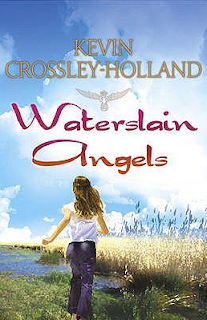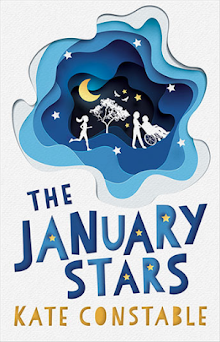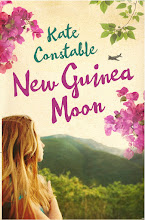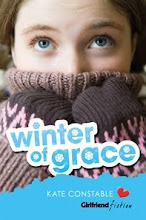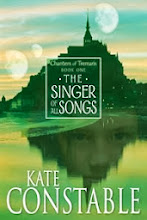I was always going to love this book. Written by Kevin Crossley-Holland, whose Arthur series I both loved and deeply admired -- check. Set in the marshes of Norfolk in the 1950's, the same setting as one of my favourite childhood novels, When Marnie Was There -- check. (Okay, Marnie was set in the sixties, but pretty damn close!) Gentle, mystical children's fiction about lost angels and the power of unexpected friendship -- tick, tick, tick.
Ten year old Annie joins forces with newcomer Sandy in a hunt for the carved wooden angels which once adorned the roof of the village church, racing against time in case unscrupulous Alan Leppard finds them first. The children discover many angels along the way, in language, flowers and dreams, and face real dangers before they find what they're seeking.
Just a lovely, lovely book. Old fashioned in the best possible way, thoughtful, poetic, slow-moving despite the odd thrilling episode, atmospheric. This won't appeal to everyone -- my friend Heather will loathe it -- but it might have been written just for me. Thank you, Kevin Crossley-Holland!
31.5.17
26.5.17
The Vanishing Moment
Borrowed from another friend. I know Margaret Wild mostly as a picture book author; The Vanishing Moment is the first YA novel of hers that I've read. Published in 2013, it's the story of two young women, Arrow and Marika, both struggling to deal with tragic events in their pasts -- in Marika's case, very recently. They both end up in the same small seaside town and strike up a tentative friendship. They also encounter a mysterious man who claims to have changed his life -- to have swapped it for a better one. Could Arrow and Marika do the same? Would they want to?
This book reminded me strongly of Margaret Mahy's magical novels, The Changeover and The Tricksters -- the endangered little brother, the coastal setting, questions of fate and free will, and young women at the centre. But instead of concentrating on the magical element, The Vanishing Moment takes its time setting up the initial scenario -- Arrow's emotional paralysis and her encounter with muggers, Marika's horrifying loss. The question of the Interchange doesn't even arise until the final quarter of the novel. After this, events swirl rapidly to a punchy conclusion.
I'm not enjoying much YA at the moment, but I did sprint through this and the last quarter of the book was a great reward for the slow start.
This book reminded me strongly of Margaret Mahy's magical novels, The Changeover and The Tricksters -- the endangered little brother, the coastal setting, questions of fate and free will, and young women at the centre. But instead of concentrating on the magical element, The Vanishing Moment takes its time setting up the initial scenario -- Arrow's emotional paralysis and her encounter with muggers, Marika's horrifying loss. The question of the Interchange doesn't even arise until the final quarter of the novel. After this, events swirl rapidly to a punchy conclusion.
I'm not enjoying much YA at the moment, but I did sprint through this and the last quarter of the book was a great reward for the slow start.
25.5.17
Chasing Redbird
Borrowed from a friend, my first Sharon Creech, and a companion piece to the other books on wilderness I read (or half-read!) for the Convent book group.
Chasing Redbird has a lot more going on than the other titles, which focused primarily on the physical demands of wilderness survival and the daily fight for existence. Zinny is part of a large family, torn by grief, and her fight is to find her own place in a teeming mass of siblings. The trail she discovers and restores is the one place where she feels free to be herself, not smothered by her family. But she also has to deal with the recent loss of her aunt, the long-ago death of her almost-twin cousin, and the unwelcome attentions of hot boy Jake Boone, who has the unfortunate habit of stealing things and giving them to Zinny to attract her attention.
I did enjoy Chasing Redbird, and the wilderness sections were lovely. But I was quite troubled by the whole Jake sub-plot -- he is pretty stalkery at times, and there's one section where he grabs and kisses her against her will, which made me shudder. What made this more creepy is that he's sixteen and she's thirteen... It all works out in the end (of course), but I felt the story skated over the implications of his behaviour in a very carefree way which disturbed me (though I did enjoy Zinny's older sister insisting that Jake must really like her, and the thwarting of that expectation!) And the complications of the family situation, and the darting back and forth between timelines, initially confused me.
Chasing Redbird has a lot more going on than the other titles, which focused primarily on the physical demands of wilderness survival and the daily fight for existence. Zinny is part of a large family, torn by grief, and her fight is to find her own place in a teeming mass of siblings. The trail she discovers and restores is the one place where she feels free to be herself, not smothered by her family. But she also has to deal with the recent loss of her aunt, the long-ago death of her almost-twin cousin, and the unwelcome attentions of hot boy Jake Boone, who has the unfortunate habit of stealing things and giving them to Zinny to attract her attention.
I did enjoy Chasing Redbird, and the wilderness sections were lovely. But I was quite troubled by the whole Jake sub-plot -- he is pretty stalkery at times, and there's one section where he grabs and kisses her against her will, which made me shudder. What made this more creepy is that he's sixteen and she's thirteen... It all works out in the end (of course), but I felt the story skated over the implications of his behaviour in a very carefree way which disturbed me (though I did enjoy Zinny's older sister insisting that Jake must really like her, and the thwarting of that expectation!) And the complications of the family situation, and the darting back and forth between timelines, initially confused me.
Labels:
book response,
children's books,
wilderness
23.5.17
Planet Narnia
I have rarely felt such genuine excitement reading a book (let alone a book of literary criticism!) as I did while reading Michael Ward's Planet Narnia.
Ward, a Lewis scholar of many years, has developed a theory so persuasive and elegant, it's utterly irresistible. Simply put, he argues that C.S. Lewis wrote the seven volumes of the Chronicles of Narnia according to a secret scheme which adheres to the seven planets of the medieval Ptolemaic universe (namely, Jupiter, Sun, Moon, Mars, Venus, Mercury and Saturn).
Thus, The Lion, The Witch and the Wardrobe bears the influence of kingly, generous Jupiter, who 'banishes winter' and forgives all. Peter swears by Jove and the colour red recurs; there is feasting and jollity. Seen in this light, the appearance of Father Christmas, sometimes seen as incongruous, makes perfect sense.
Prince Caspian is influenced by war-like, disciplined, knightly Mars; The Voyage of the Dawn Treader by golden, joyous Sol; The Silver Chair by watery, submissive Luna; The Horse and his Boy by quicksilver, eloquent Mercury, forever dividing and uniting; The Magician's Nephew is ruled by fertile, life-giving Venus; and Saturn, old, cold, ugly and deathly, rules over The Last Battle.
There is too much textual evidence to repeat here, and I must admit I skimmed some of Ward's more abstruse philosophical discussions. There is also a lot of material on Lewis's Out of the Silent Planet trilogy, which anticipates and reinforces Lewis's thoughts on the planets. I'm convinced that Ward has indeed found an important key to understanding the Narniad. The glorious jumble of imagery and atmosphere, the apparent unevenness of plot and some inconsistencies are at last explained. For example, the figure of Aslan is no longer a simple allegory for Christ, but appears in different planetary guises and roles in each volume.
This book has made me see these beloved books in an entirely new light. I can''t wait to read them again!
Ward, a Lewis scholar of many years, has developed a theory so persuasive and elegant, it's utterly irresistible. Simply put, he argues that C.S. Lewis wrote the seven volumes of the Chronicles of Narnia according to a secret scheme which adheres to the seven planets of the medieval Ptolemaic universe (namely, Jupiter, Sun, Moon, Mars, Venus, Mercury and Saturn).
Thus, The Lion, The Witch and the Wardrobe bears the influence of kingly, generous Jupiter, who 'banishes winter' and forgives all. Peter swears by Jove and the colour red recurs; there is feasting and jollity. Seen in this light, the appearance of Father Christmas, sometimes seen as incongruous, makes perfect sense.
Prince Caspian is influenced by war-like, disciplined, knightly Mars; The Voyage of the Dawn Treader by golden, joyous Sol; The Silver Chair by watery, submissive Luna; The Horse and his Boy by quicksilver, eloquent Mercury, forever dividing and uniting; The Magician's Nephew is ruled by fertile, life-giving Venus; and Saturn, old, cold, ugly and deathly, rules over The Last Battle.
There is too much textual evidence to repeat here, and I must admit I skimmed some of Ward's more abstruse philosophical discussions. There is also a lot of material on Lewis's Out of the Silent Planet trilogy, which anticipates and reinforces Lewis's thoughts on the planets. I'm convinced that Ward has indeed found an important key to understanding the Narniad. The glorious jumble of imagery and atmosphere, the apparent unevenness of plot and some inconsistencies are at last explained. For example, the figure of Aslan is no longer a simple allegory for Christ, but appears in different planetary guises and roles in each volume.
This book has made me see these beloved books in an entirely new light. I can''t wait to read them again!
Labels:
book response,
literary criticism,
Narnia,
non-fiction
22.5.17
My Father's Books
| Half a shelf's worth; approximately one twenty-fouth of the library |
The extent of Dad's hoarding was suspected, but never confirmed, until it came time to clear out my parents' house for rental. To give you some idea: Michael has been sorting through the two rooms that made up Dad's study; I have done the whole of the rest of the house. My job was far easier, I'm all finished! Michael is still going.
A hoarder Dad may have been, but he was never really much of a reader. As well as all the other things he collected (stamps, coins, business cards, matchbooks, train tickets, computer software, cameras, model aeroplanes...), he amassed a library, which contained many books he'd used in teaching -- texts on principles of flight, meteorology, aircraft magazines, cloud atlases -- as well as various other books that reflected his other interests -- travel guides, dictionaries, photography manuals, bird guides, street directories, histories of classical music.
It was fairly easy to decide about the other books, whether to keep them ourselves or pass them on, but the aircraft collection was more difficult. They were so specialised, so niche -- yet there were so many of them! Wasn't it better to try to keep them as a collection, for someone who might appreciate them?
And we found someone. A young woman associated with the flying school where Dad had taught for several years, someone who loves books (and also, coincidentally, is fascinated by PNG) and flying. She was dumbstruck when she first saw Dad's collection -- awesome and insane was what she finally stammered. She ended up loading her car with textbooks, maps, flight manuals, course materials, NOTAMs, notebooks and other treasures -- this was the back seat. The boot was full as well. Her poor little car was groaning, and dipping at the rear.
She spent a couple of hours exclaiming and exploring: we still use these sheets! Oh wow, this is from 1975! I've never seen anything like it... Some things she'll keep and some she'll give away, but I feel reassured that this part of Dad's collection, at least, is in good hands.
Thank you!
On Looking
I bought On Looking from Brotherhood Books (yeah, yeah, I know...) but it wasn't until I began to read it that I realised I'd read a review or an extract from it a few years ago and tucked it away in the back of my mind.
Horowitz, a neuroscientist, has come up with a fantastic idea for a book, which appealed to me instantly: instead of repeating her familiar dull walk around the block with the dog (in New York City), she takes various 'experts' and others with her, to find out what they observe and she has missed. She walks with a blind person, a painter, a geologist, a specialist in fonts and graphics, her own toddler son and her dog, and records the different ways they experience and make new this familiar territory. She is shown bugs and signs of wildlife she's never noticed, hears sounds and smells odours that had escaped her attention.
I did enjoy this book, but ultimately it promised more than it delivered. Perhaps because On Looking was necessarily so rooted in a particular place, a place unfamiliar to me, it held less resonance than the same concept set in, oh, I don't know, the suburbs of Melbourne? The plants and architecture were unknown to me, the wildlife is different, the streets and traffic don't operate in quite the same way. Some chapters were more successful than others -- the geology one was frankly dull, despite Horowitz's best attempts to spice it up. On the other hand, the walk with the blind woman was absolutely fascinating, as was the chapter with the sound effects guy.
Overall, a mixed success, but more enjoyable than not.
Horowitz, a neuroscientist, has come up with a fantastic idea for a book, which appealed to me instantly: instead of repeating her familiar dull walk around the block with the dog (in New York City), she takes various 'experts' and others with her, to find out what they observe and she has missed. She walks with a blind person, a painter, a geologist, a specialist in fonts and graphics, her own toddler son and her dog, and records the different ways they experience and make new this familiar territory. She is shown bugs and signs of wildlife she's never noticed, hears sounds and smells odours that had escaped her attention.
I did enjoy this book, but ultimately it promised more than it delivered. Perhaps because On Looking was necessarily so rooted in a particular place, a place unfamiliar to me, it held less resonance than the same concept set in, oh, I don't know, the suburbs of Melbourne? The plants and architecture were unknown to me, the wildlife is different, the streets and traffic don't operate in quite the same way. Some chapters were more successful than others -- the geology one was frankly dull, despite Horowitz's best attempts to spice it up. On the other hand, the walk with the blind woman was absolutely fascinating, as was the chapter with the sound effects guy.
Overall, a mixed success, but more enjoyable than not.
17.5.17
The Story of English in 100 Words
Evie took one look at this book and said, 'But this is longer than a hundred words... Ohhhh, right, okay.'
In a neat conceit, linguist David Crystal makes a survey of one hundred English words, starting with the rune for 'roe' scratched on a deer bone, possibly the earliest written word in English ever found, and moving through the centuries to take in 'lea' (a clearing, a word element which survives in countless place- and surnames, like Bromley or Dunkley), 'potato', 'jazz' and up to 'twittersphere' in the twenty-first century. He manages to cover much of the same ground as Mother Tongue -- borrowings from other languages, truncations and elaborations, swear words and technical terms. But with only a couple of pages available for each word, this ends up being more of a skim than a delve.
A quick, fun and informative read that will probably leave the reader wanting more.
In a neat conceit, linguist David Crystal makes a survey of one hundred English words, starting with the rune for 'roe' scratched on a deer bone, possibly the earliest written word in English ever found, and moving through the centuries to take in 'lea' (a clearing, a word element which survives in countless place- and surnames, like Bromley or Dunkley), 'potato', 'jazz' and up to 'twittersphere' in the twenty-first century. He manages to cover much of the same ground as Mother Tongue -- borrowings from other languages, truncations and elaborations, swear words and technical terms. But with only a couple of pages available for each word, this ends up being more of a skim than a delve.
A quick, fun and informative read that will probably leave the reader wanting more.
9.5.17
Mother Tongue
Evie has been on a bit of a language kick lately -- which means reading Wikipedia articles about slang and the origins of English. So I dug out Bill Bryson's Mother Tongue for her, thinking it might be of interest, and of course ended up reading it myself.
Published in 1992, I dare say the scholarship has advanced since it was written, as has technology: no internet or smartphones mentioned in this text! And the cover could do with reworking, in fact I think in later editions it has been. A Bill Bryson book is never less than supremely entertaining, though the facts are sometimes a little loose (Australians don't habitually drop the u in words like 'labor' - only when we're talking about political parties; and is an ice-crean tub in Victoria really known as a 'pixie'? Not in my lifetime!)
As a rapid, amusing sweep through the history of English and its rise as a global language, it's a fun ride and packed with fascinating snippets and anecdotes. But I would hesitate to rely on it as an authoritative academic source, despite the massive bibliography in the back.
Published in 1992, I dare say the scholarship has advanced since it was written, as has technology: no internet or smartphones mentioned in this text! And the cover could do with reworking, in fact I think in later editions it has been. A Bill Bryson book is never less than supremely entertaining, though the facts are sometimes a little loose (Australians don't habitually drop the u in words like 'labor' - only when we're talking about political parties; and is an ice-crean tub in Victoria really known as a 'pixie'? Not in my lifetime!)
As a rapid, amusing sweep through the history of English and its rise as a global language, it's a fun ride and packed with fascinating snippets and anecdotes. But I would hesitate to rely on it as an authoritative academic source, despite the massive bibliography in the back.
3.5.17
The Exiles at Home
Hilary McKay is very good at capturing the amiable chaos of middle class family life, but I still had trouble telling the four girls apart (except for implacable Phoebe, the youngest, who is very vivid). I am curious to read the final volume in the trilogy, The Exiles in Love, but I don't know that I'm keen enough to actually pay full price for it... It might be one that I keep an eye out for second-hand.
Subscribe to:
Posts (Atom)

